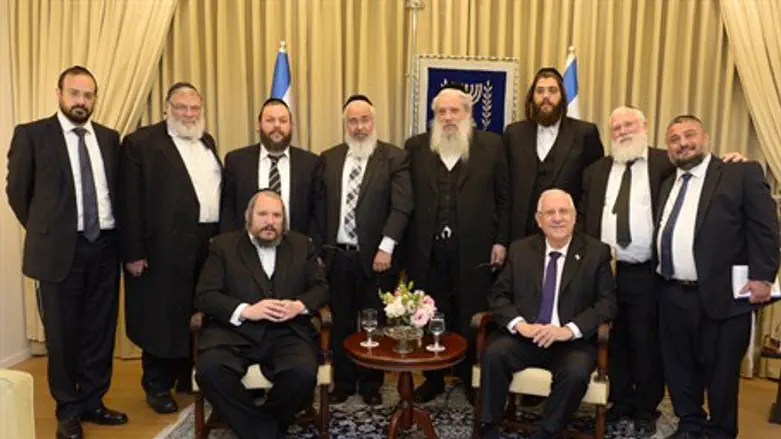
President Reuven Rivlin met Monday with the Forum for Haredi Mayors and Municipal Council Heads at the President's residence.
This is the first time this forum - which has been in operation for around eleven years - has met with the President formally, in order to discuss issues of importance for the Haredi sector.
At the beginning of the meeting, the President noted the importance of accepting the haredi sector into society, and no longer as a minority. He stressed the need to develop and deepen the dialogue between the different communities that make up Israeli society.
“In 2018, almost a quarter of the first grade students in Israel will be from the Haredi community," he began. "This community is no longer a minority and we must understand this and adjust our concept regarding the nature of the relationship – no longer as that of a majority and minority but of a partnership between the haredi community and the general public."
"Within this partnership, first and foremost it is our duty to desist from patronization," he stated. "The general public, which I am part of, cannot and should not determine for the haredi public how and in which way to educate their children. A partnership means creating a discourse between all sectors of society, not as one which is characterized by forceful coercion, but as a discourse that is underlined by understanding, and outlines a path to the future."
The President added that partnership demands sacrifice from all the partners, and stressed the need to integrate the Haredi community into the labor market and the economy.
"Every one of us bears responsibility for the future of Israel," he stated. "We all need to be concerned for Israeli society, the Israeli economy and join in our existential fight here."
"The State of Israel today encourages the integration of haredi public into the labor market, and into the civil service, but must also open its doors by recognizing their religious studies," he continued. "We need to aspire to see within public service haredi representatives relative to their size within the population. We must find a way to overcome obstacles, either by legislation or government decisions."
The President noted that the President's office had joined in collaboration with the haredi community in order to promote integration and stressed the need for the mayors to take part in the this joint effort.
"The President's office is willing to cooperate with the leaders of the private economic sector in an effort to incorporate more haredi workers into the labor market and facilitate with this integration," he declared. "This matter must be taken to heart."
"As mayors you are among the leaders of the haredi community, and I believe that together we can collaborate and bring about this desired change," Rivlin added. "The haredi community will benefit, and so will the entire Israeli society, and our common future here."
The mayors spoke warmly about the forum's existence and expressed a deep appreciation to the President for his widespread activities on behalf of the haredi community, and especially with regards to vocational integration.
Following these words of greetings, the mayors addressed the President and raised various issues of importance to the haredi community.
"During the disaster in Nepal we witnessed the Chabad House, ZAKA rescue and Hatzalah - three haredi organizations, leading volunteer rescue operations," Chairman of the haredi Regional Councils Forum and Mayor of Beitar Illit, Rabbi Meir Rubinstein stated. "For some reason, when it comes to the political issues we are treated differently."
"A request of any party political is called 'negotiations,' but when it comes to the haredi parties, it is suddenly called "extortion," he claimed. "Incitement against the haredi sector should not be allowed." Concluding his speech, Rubinstein asked the President, on behalf of the forum members, to work to change the method of budgeting in the country, which currently discriminates against weak local authorities.
"The atmosphere is poisoned," Rabbi Hanoch Zeibert, Mayor of Bnei Brak, added. "Once we were considered families "blessed with many children", later changed it to a "family with many children", and today it has become "problems of families with children."
"In Beit Shemesh we are investing in activities and cooperation with all authorities and sectors - for example, the new police center which has been inaugurated in the city and many other activities," Mayor of Beit Shemesh, Rabbi Moshe Abutul, claimed. "On the other hand, whatever we're supposed to get, I have to beg for. There are no proper arrangements for educational infrastructure, classes, public institutions, etc. The government vision must change."
Mayor of Modi’in Illit, Rabbi Yaakov Gutterman said, "We are citizens with equal rights. We are not supposed to beg to get what we deserve. A haredi citizen does not enjoy the same opportunities. Everything we received was achieved through lobbying and pleas. The method is to turn us into beggars. There is discrimination in special education as well as related to employment."
"Polarization is rife within the public today," Mayor of Elad, Rabbi Yisrael Porush, concluded. "Something bad is happening within the Israeli public. Order needs to be made in all walks of life here. We are clearly discriminated against, especially in comparison to other cities in the country. It is time to change the atmosphere as well as the method."